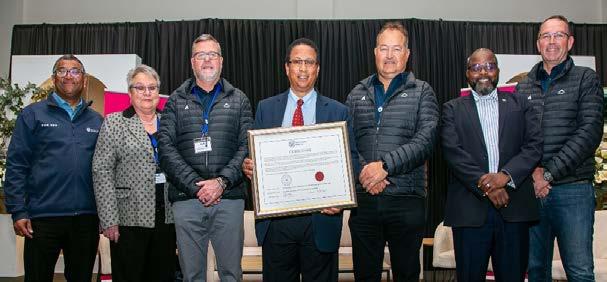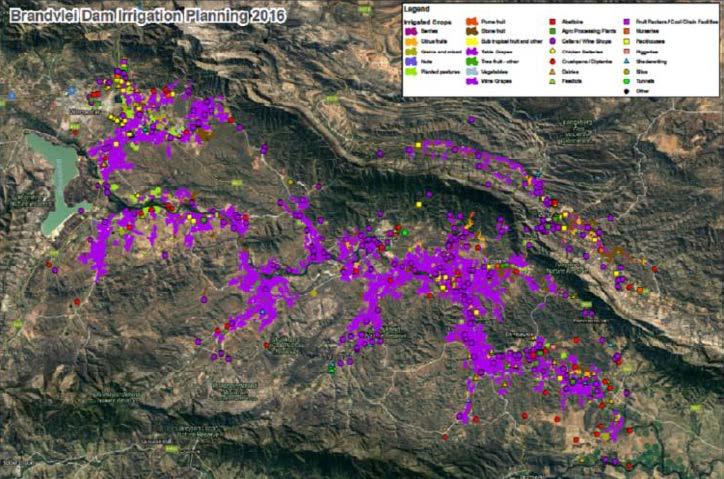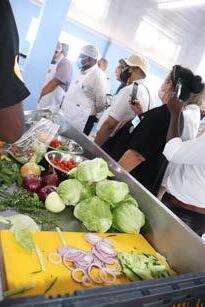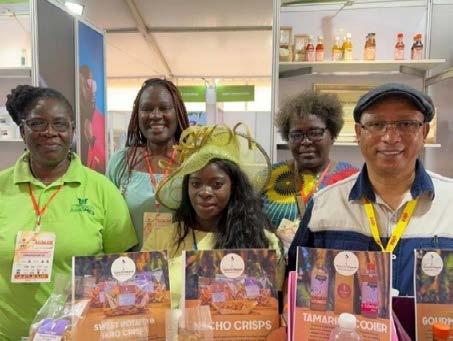HIGHLIGHTS PER MINISTERIAL PRIORITY FOR THE PERIOD 2019 TO 2024

STRUCTURED EDUCATION, TRAINING AND RESEARCH
1.Outcomes
Western Cape Department of Agriculture | Record of Delivery 2019-2024 15
Number Indicator Achievement T.5.1.1 Number of research projects implemented to improve agricultural production 106 Number of new technologies transferred to farmers 6 Number of online publications developed 35 Number of online tools and web portals maintained 3 Number of training courses offered through a blended learning approach 5 per annum (2019-2021: phasing out of Higher Certificate and the One-Year Diploma 3 per annum (2022 till date) Number of students graduated since 2020 through blended learning 967 (Dec 2019 until Dec 2023) Number of students completing technology training initiatives such as drone technology, webinar conferences and online materials development and teaching 479 Number of bursaries awarded to students studying towards agriculture related qualifications 257 Number of scholarships awarded to learners at agricultural schools and schools with mathematics and science 22 Number of matric internships offered to unemployed matriculants in rural areas and on farms (Agricultural Partnership for Youth Development Programme) 331 Number of student internship opportunities offered to students to complete their work integrated learning 96
2. Achievements
• The Elsenburg Agricultural Training Institute continued to provide agricultural education and training to 2 248 registered students since 2019. Short skills courses were offered to 17 098 beneficiaries, a total of 180 students articulated from the Learnership Programme into the Higher Education and Training band and the College provided financial support to 539 qualifying students.
• Furthermore, 781 interns were appointed to gain workplace experience and earn a stipend, 53 interns obtained permanent employment due to participation in the internship programmes, 257 bursaries were awarded for under and postgraduate studies in an agricultural related field, 22 scholarships were awarded to grade 8-12 learners at agricultural schools and schools with science and mathematics.
• The New Diploma in Agriculture, on National Qualification Framework Level 6 (NQF6), was registered with the South African Qualifications Authority (SAQA) in 2019 and implemented in January 2020.
• The College concluded the first Recognition of Prior Learning Programme (RPL) in 2022 and the second RPL programme will be concluded by the end of July 2024. A total of 47 RPL beneficiaries graduated on 4 April 2022 and another graduation for RPL beneficiaries is planned for 2024.
• The celebration of the 125 th birthday of the College was held in 2023 with the highlight of the celebration occurring together with the 2023 graduation ceremony.
• The evaluation to determine the employability of Elsenburg graduates was concluded. The evaluation found that 68.1% of the graduates were more likely to be employed. This is 26.4% higher than their counterparts surveyed in StatSA’s Quarterly Labour Force Statistics. A Management Improvement Plan is in place to address all recommendations made in the report.
• The 17 th Annual Ostrich Auction (2021) with 80 birds was held on 16 March 2021 at Oudtshoorn Research Farm and will bolster the ostrich industry with superior genetic material. This was followed by a successful Ostrich Products Showcase, hosted by Minister Meyer, for foreign dignitaries, which was supported by the SA Ostrich Business Chamber and Cape Karoo International at Leeuwenhof on 14 March 2022.
• The Western Cape Cannabis Framework and Implementation Plan (CanPlan) was completed and launched at the Ministerial Stakeholder meeting on 29 March 2023.
Western Cape Department of Agriculture | Record of Delivery 2019-2024 16
Number Indicator Achievement Number of graduate internship (CASP) opportunities for youth to alleviate unemployment and gain relevant work experience. 354 Number of Young Professional Persons participating in youth development programme for masters’, honours and doctorate studies 12
Table 1: Outputs for Ministerial Priority on Structured Education, Training and Research
3. Conclusion
This Ministerial priority has focused attention on the importance of capacity building and the development of skills, whether through formal programmes, or short courses. The full impact may not be felt in the short-term and is not be limited only to the Western Cape. This investment in people can never be underestimated, as the sustainability of agriculture is underpinned by the Department's commitment to growing people.
This sustainability is further strengthened by the comprehensive research agenda. These projects that we celebrate and highlight must therefore continue in order to sustain our future and expand our footprint in support of growth, jobs and safety.



Western Cape Department of Agriculture | Record of Delivery 2019-2024 17

FARMER SUPPORT
1.Outcomes
2. Achievements
The APSD Programme continued to provide support to producers through agricultural development programmes/initiatives via the CASP/llima grant funding, linked to the commodity approach to enable and ensure the transformation of the agricultural sector, which leads to economic growth, inclusion and increase in food production, among others.
To date, 156 Farmer Days have been held across all the districts of the Western Cape.
These engagements created a platform for a direct interface with farmers and other agricultural stakeholders in the district to discuss topical issues relevant to the district, transversal agricultural policy frameworks that impact the agricultural sector, as well as the sharing of ideas, best practices and expertise among agricultural role-players.
Furthermore, for the period 2019 – 2023/24, the grant allocation per commodity, as illustrated below, contributed to various production inputs and infrastructure needs, as requested by land reform farmers and or private landowners, as defined by the criteria of CASP. This financial contribution directly impacts and supports the sustainability of land reform enterprises, whilst ongoing producer support services, i.e. extension and advisory services are available to the farmers. See table below.
Furthermore, through the grant allocation, several farmers have benefited over the said period, totaling R596 871 million. The allocation is spread over various commodities and districts linked to the applications received each year. See the below illustration.
Western Cape Department of Agriculture | Record of Delivery 2019-2024 18
Number Indicator Achievement P.3.1.1 Number of black commercial farmers supported 170 P.3.2.1 Number of visits to farmers for extension services 20 349 P.5.2.3 Number of technology transfer events organised and presented 72
Table 2: Outputs for Ministerial Priority on Farmer Support

Western Cape Department of Agriculture | Record of Delivery 2019-2024 19 Financial Year Smallholder Farmers Black Commercial Farmers Red Meat Grain Citrus 2019/20 55 58 2020/21 61 30 2021/22 43 36 9 11 1 2022/23 31 25 12 2 1 2023/24 39 19 13 19 Total 229 168 34 15 2 2019/20-2023/24 INDICATORS 2019/20 2020/21 2021/22 2022/23 2023/24 TOTAL Smallholders 55 61 43 31 39 229 Subsistence 102 132 142 201 144 721 School 26 43 26 33 22 150 Food Gardens 1 2 2 4 4 13 Households 1 003 5 626 2 612 3 992 3 752 16 986
Table 3: CASP and Ilima allocations
Table 4: Number of farmers and commodities supported
Table 5: Categories of farmers supported
SUCCESS STORIES OF FARMERS THAT BENEFITED FROM THE SUPPORT:
Akkedisberg Workers Trust / Southern Treasures Wines
On a long winding road in the Kleinrivier Valley of the Overberg district, you will find a very special vineyard. This project is a wine grapes production unit. The beneficiaries rent 20ha from the farm owner for a period of 30 years. The project started during 2014. This project aims to empower the farm workers who also reside on the farm. The beneficiaries established a private company, Akkedisberg Boerdery, (PTY) Ltd with two directors who manage the business on a day-to-day basis. Since 2014, this project has been supported by the Western Cape Government with various inputs and the establishment of vines. Included is a tractor and sprayer. Twenty hardworking men and women make up the Akkedisberg trust (10 males and 10 females). Since 2014 till current, a total of 16ha of vines have been planted with the support granted by the Wine Grape CPAC. The project harvested its first crop during March 2018.
The group designed and registered their own brand - Southern Treasures. Andrew Moos is a farm labourer turned cellar hand, trained by Josef Dreyer in the art of winemaking. Andrew’s 20 years of hands-on cellar experience combined with generational knowledge, intuitive understanding of the land he grew up on and his innate viticulture talent makes him uniquely skilled to create wines.
They also market their own wines. Support is still needed with new markets for their product. A process has also been started whereby eight of the members can get recognition of prior learning through the Agri-seta and obtain a qualification.

La Vouere (Pty) Ltd

Tweefonteinen farm number 368 portion no. 40 with an extent of 32.79 hectares was acquired through a land reform programme in 2003 and is in the name of La Vouere (Pty) Ltd. Tweefonteinen farm no. 368 of portion no. 42 with an extent of 77.41hectares was acquired through own funding. There are two beneficiaries in the business, a male and female. The farm is 110.6 ha with total farmable land of 85 ha and 38.8 ha of nectarine fruit trees. The farm is managed as a family business and as such it is easy to report back on daily farm activities, developments and decision taken to enhance prosperity of the
Western Cape Department of Agriculture | Record of Delivery 2019-2024 20
farming business. The farm has entered into a partnership with Verdun Estates and formed an operating company called La Vouere Stonefruit. The shareholding in this company is 51% La Vouere (Pty) Ltd and 49% Verdun Estates.
La Vouere market the fruit via the mentor (Verdun Estates). Verdun Estates market the fruit locally and internationally and have BRC and GlobalGAP certification. The farm is GlobalGAP and SIZA certified. Fruits are produced under market specification and meet the requirements as specified in the applicable standard for grades of the market, colour, packaging and product, grading according to their market specification.




Signing of MoUs with Commodity Partners
The Agricultural Producer Support and Development programme through its Extension and Advisory Services sub-programme has provided continued agricultural support to all farmers through the site visits and advice given to them. Over the past five years more than 20 000 site visits to farmers were done to give advice and to strengthen performance and commercialisation of land reform enterprises.
The commodity approach adopted by the Department has provided added support to the extension practitioners as the commodity partners continue to provide support through their mentorship programmes. The Department have signed Memorandum of Understandings (MoUs) with eleven commodity partners as well as with the Department of Correctional Services, with whom it has started to implement joint projects.
Western Cape Department of Agriculture | Record of Delivery 2019-2024 21
Signing of MoUs with Commodity Partners for the next three years

Departmental Extension and Advisory Symposium
This event has been an opportunity/platform for extension practitioners to showcase some of their research and successes, learn from each other, receive farmers feeback and share some of the latest technologies in agriculture. This ensures that there is continuous learning and improvement in the sector.


The programme for the symposium is meticulously planned and discussed by the steering committee that ensures the most relevant theme and speakers are identified.
One Home One Garden
One Home One Garden programme was launched in George and then later in Mitchells Plain in September 2020. The main aim is to encourage the citizens of the Western Cape to establish food gardens so that they can produce their own food and not rely on purchased food, thereby improving on household food security and nutrition.
Just after launching this campaign, Minister Meyer and the Department upscaled the number of Household Agricultural Food Production Initiatives from 800
Western Cape Department of Agriculture | Record of Delivery 2019-2024 22
The departmental extension and advisory symposium provides a platform to recognise the hardworking extension officers and staff members of the WCDoA.
to 5 626. Out of this, about 2 000 food gardens were implemented between September to December 2020. This has helped put food on the tables of many poor households. This was matched with increased support towards community food gardens, where 61 projects were supported.
In living the values of the Western Cape Government, the Department has supported more than 16 000 household with means to produce their own food since 2019.
The impact of these interventions was assessed by an external evaluation which revealed that over 70% of the supported were able to meet their food needs, post intervention.


Western Cape Department of Agriculture | Record of Delivery 2019-2024 23
World Food Day
The United Nations Food and Agriculture Organization (FAO) adopted 16 October as World Food Day to commemorate the founding of the organisation in 1945. Addressing the challenges of Food Insecurity and Nutrition remains top of the agenda of the Department. The purpose of World Food Day is to heighten public awareness of the world food shortage and to strengthen solidarity in the struggle against hunger, malnutrition and poverty.
Food Security Interventions
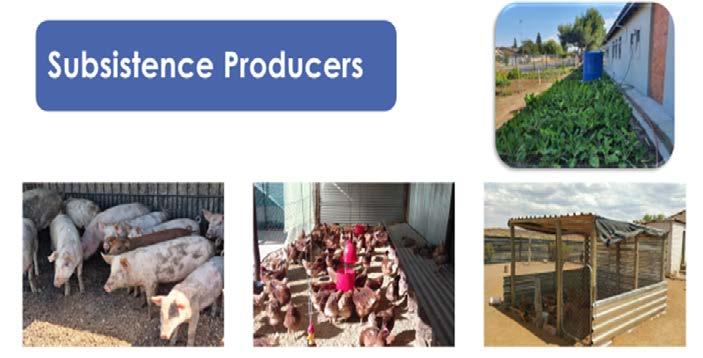
Benefit of a Household Food Garden

Food Security Interventions

Western Cape Department of Agriculture | Record of Delivery 2019-2024 24


Western Cape Department of Agriculture | Record of Delivery 2019-2024 25
Food Security Interventions
3. Conclusion
It must be emphasised that partnerships and relationship building, i.e. with industry partners, commodity organisations, the farmers and government (DALRRD), as the enablers for grant fund support, as well as expert extension advice and tailored producer support programmes/initiatives, are the building blocks to sustainable agricultural enterprises.
From 1 April 2019 to 31 March 2024, we have supported more than 16 986 households with agricultural food production initiatives, more than 229 smallholder farmers, more than 721 subsistence farmers, 150 schools’ food gardens, and 13 food garden promotion and awareness raising sessions.

RURAL SAFETY
1.Outcomes
Rural Safety as a priority was about creating an enabling and safe environment for farmers and agri-workers in the Western Cape. In reponse to this, the Department of Police Oversight and Community Safety (DPOCS) in partnership with the South African Police Service (SAPS), drafted a Provincial Rural Safety Plan, to respond to the rural safety challenges and needs identified by relevant stakeholders.
The inadequate and fragmented rural safety and security measures remain a threat to farmers and agri-workers as well as human dignity, as it has a direct impact on agricultural growth and job security. To this end, the Rural Development Programme within the WCDoA facilitates the Safety Priority, which promotes rural safety, for a safer and secure agricultural environment, in collaboration with the DPOCS, SAPS, Department of Mobility, Department of Home Affairs, Department of Employment and Labour, as well as Organised
Western Cape Department of Agriculture | Record of Delivery 2019-2024 26
Number Indicator Achievement P.8.1.2 Number of Rural Safety Committee engagements held. 17 P.8.2.1 Number of information sharing sessions facilitated with relevant stakeholders in rural areas. 33 P.8.1.3 Number of structured engagements/Meetings with safety structures in districts. 17 P.8.2.2 Number of Rural Safety Summits hosted. 1
Table 6: Outputs for Ministerial Priority on Rural Safety
Agriculture (Agri Western Cape).
Over the last five years the WCDoA coordinated key initiatives in an attempt to strengthen the relevant safety structures, such as encouraging the accreditation of farm/neighbourhood watches. Key interventions implemented includes:
• Institutionalisation of Rural Safety as a Ministerial Priority;
• Establishment of a Rural Safety Desk;
• Development of the Rural Safety Monitoring Dashboard;
• Conducting of a Rural Safety Baseline Study;
2. Achievements
• Development and distribution of a Rural Safety Pocket Guide and brochures (Rural safety awareness and information sharing).
2.1 Institutionalisation of Rural Safety as a Ministerial Priority
Duly institutionalised, signed off and approved by Provincial Cabinet in 2020. The impact of a lack of safety across all sectors and all levels, whether it be individual, relationship, community or societal, was substantial, and therefore the Department took the lead in the Inter-Ministerial Committee (IMC) on Rural Safety, chaired by Minister Meyer, and Technical Committee on Rural Safety (TCRS), chaired by the Deputy Director General Mr Darryl Jacobs.
Partnerships and collaboration are essential to ensure the safety of the citizens of the Western Cape. SAPS, Western Cape Government (WCG) and community structures working together in a collaborative manner are important to advance rural safety. The TCRS forum brings together key stakeholders and safety coordinators from across the province to discuss and address safety-related matters. A report is then provided to the IMC for noting indicating progress made by the TCRS for a specific quarter. Following these deliberations, action plans were developed to address the issue of undocumented foreign nationals working on farms.
The IMC's main goal is to assess the Western Cape's Rural Safety Plan and other related rural safety structures, using the data provided by the TCRS. It also aims to identify the needs and priorities for policing, as well as taking farm attacks into account. Collaboration and strong linkages with all the roleplayers in the agricultural sector are crucial in identifying vulnerable rural areas, creating action plans and monitoring land invasion protocols. The IMC submits quarterly reports to the Western Cape Cabinet and regularly reports to the media on farm attacks and rural safety. One of the actions emanating from an IMC meeting was to address the issue of undocumented foreign nationals working on farms. This culminated into a Dialogue Session with all role-players to discuss the issue.
2.2 Establishment of the Rural Safety Desk
The Rural Safety desk was established for the monitoring, verification and tracking of incidents of crime received by the WCDOA. In addition, it provides
Western Cape Department of Agriculture | Record of Delivery 2019-2024 27


a platform for the public, farmers/producers, agri-workers and agricultural stakeholders to log enquiries, queries and matters on rural safety. This information is received via email, WhatsApp messages, any form of written correspondence as well as a dedicated email address developed for this purpose (DOA.Ruralsafety@westerncape.gov.za). The Project Coordinator in the Rural Development programme is responsible for the monitoring of the Rural Safety Desk. Incidents reported are followed up and verified by the Project Coordinator. The desk provides valuable information to stakeholders such as SAPS, who follow up on incidents and provide progress on cases, including case numbers and court appearances. The Court Watching Brief Unit from DPOCS closely monitors these cases from the time of arrest until the court case has ended. The smooth functioning of the Rural Safety Desk involves:
• Collating and recording data - as received from CDOs and other sources - on various farms and rural communities regarding crime;
• Escalating cases to the appropriate Law Enforcement agencies i.e. via DPOCS for investigation by SAPS officials;
• Monitoring and tracking of incidents reported;
• Providing feedback to the Rural Safety Committees in the form of statistics, progress reports etc.;
• Facilitating sharing of valuable information with rural communities, agriworkers and farmers via institutional structures by CDOs and DDs
• Updating the web-based online reporting platform with relevant data. The Rural Safety Desk is linked to the Rural Safety Dashboard and has been successful in strengthening collaborative efforts between stakeholders such as SAPS, DHA, DEL, DPOCS and WCED, towards improving rural safety in the rural and farming communities. The ultimate goal is to create a safe and thriving agricultural sector.
Western Cape Department of Agriculture | Record of Delivery 2019-2024 28
Minister Allen and Minister Meyer –Co-chairs of IMC
Dialogue Session on employment of undocumented foreign nationals


2.3 Rural Safety Monitoring Dashboard
The value add of the Rural Safety Dashboard is that it is able to track hotspots and vulnerable areas as well as statistics on the various type of crimes. The Department developed a Rural Safety Monitoring Dashboard, in conjunction with Enterprise GIS-solutions, to monitor rural safety incidents reported within the agricultural environment. This interactive digital platform uses mobile and web-mapping applications to identify rural crime hotspots and inform data-led rural safety interventions. The platform collaborates with district safety forums to improve safety within rural and agricultural communities across the province. It further informs data-led rural safety interventions with the aim of improving safety within rural and agricultural communities across the province.
Over the last five years, eighty-four incidents have been recorded on the rural safety monitoring dashboard. The Dashboard provides:
• Institutionalisation of a safe and secure portal for rural safety incidents;
• A management tool for monitoring and tracking;
Western Cape Department of Agriculture | Record of Delivery 2019-2024 29
Rural Safety Dashboard process
Minister Meyer attending court proceedings of farm attacks
• Tracking and viewing of statistics per district/municipality, as well as the type of incidents reported, overview of trends and
• Sharing of data with DPOCS for integration into a provincial dashboard, and District Safety Forums for further investigation/follow-up, where needed.
The Rural Safety Desk is linked to the Rural Safety Dashboard and has been successful in strengthening collaborative efforts between stakeholders such as SAPS, DHA, DEL, DPOCS and WCED towards improving rural safety in the rural and farming communities. The ultimate goal is to create a safe and thriving agricultural sector.

Rural Safety Monitoring Dashboard
2.4 Rural Safety Baseline Study
The WCDOA appointed a service provider to conduct a survey to establish a baseline on the incidents and influence of crime, functioning of farm watches and safety perceptions in rural areas of the Western Cape Province. The findings showed that farmers/producers and agri-workers constantly live under the fear that they will become victims of crime. Thus, it is important that the Western Cape Government continuously displays its commitment to support the farming community in the fight against crime in rural regions.
One of the findings was that farm owners should be encouraged to implement more sophisticated security measures, such as fencing, cameras, lights, alarm systems and gates, to protect themselves and agri-workers, especially during the night and over weekends. Through the IMC and district safety forums, the WCG has lobbied for the integration of technology systems, in order to establish a Central Command Centre with the Provincial Disaster Management Centre, to improve safety and deter criminals. This will facilitate the flow of crime intelligence information and encourage the integration of District Municipalities, Neighbourhood Watches and Farm Watches.
Another finding of the study was the establishment of a one-stop crime prevention helpdesk, which was done by the WCDOA. Based on the findings, a Management Improvement Plan was developed, to address the areas of concern in a holistic manner.
Western Cape Department of Agriculture | Record of Delivery 2019-2024 30

2.5 Development and distribution of Rural Safety Pocket Guides and Brochures (Rural Safety awareness and information sharing).
The WCDoA, in collaboration with the Western Cape Mobility Department (Road Safety Management Unit and Provincial Traffic) facilitated and implemented rural safety awareness sessions among stakeholders in the agricultural sector. The session focused on the safe transportation of agri-workers, as well as safety in broader rural communities.


Western Cape Department of Agriculture | Record of Delivery 2019-2024 31
Baseline Study on Crime in Rural Areas of the Western Cape
Rural Safety Brochure
Rural Safety Pocket Guide
Over the past five years, the WCDoA has facilitated the following:
• During 2023, the WCDoA held Road Safety Awareness Sessions in collaboration with the Western Cape Mobility Department (Road Safety Management Unit) and Provincial Traffic in the Overberg, Cape Winelands and the West Coast. Similar sessions were held in 2021 and 2022. The purpose of the engagements was to create awareness amongst agriworkers and producers regarding the safe transportation of agri-workers.
• Continuous liaison with the Road Safety Management Unit on road and pedestrian safety and providing contact details to assist producers in this regard.
• The Rural Development Programme promotes and encourages producers, farm management and agri-workers to adhere to legislation and protocols, highlighting best practices related to safe and dignified transportation of agri-workers.
• The Provincial Minister of Agriculture, Dr Ivan Meyer, addressed the matter of Regulation 247 in a letter to the Provincial Minister of Mobility, Mr McKenzie, concerning the safe and dignified transportation of agri-workers. This will ensure that the issue is given priority and attention, as agri-worker fatalities and injuries have a direct impact on farm production and day-today operations.
• In addition, Minister Meyer requested that the matter be raised at national level with the Minister of Transport, Ms Sindisiwe Chikunga, via the Minister of Agriculture, Land Reform and Rural Development, Ms Thoko Didiza. This will potentially influence the legislation regarding the safe transportation of agri-workers, to improve the safe and dignified transportation of agriworkers.
• General Road Safety is also highlighted in the Pocket Guide for Rural Safety, which is shared with stakeholders across the agricultural sector. For a copy of the Rural Safety Pocket Guide, visit: https://www.elsenburg. com/programmes/rural-safety/

Western Cape Department of Agriculture | Record of Delivery 2019-2024 32
Awareness and Information Session on Pedestrian Safety
In addition, the purpose of the sessions was also to create awareness among rural communities and provide a platform where they can engage relevant government departments and key stakeholders on issues relating to Gender Based Violence, social ills, unemployment etc.
3. Conclusion
The WCDoA is in the process of appointing a service provider to conduct an evaluation of the rural safety interventions and draft a proposed Rural Safety Strategy for the WCDoA. Rural safety will remain a priority for the Department and the programme will continue to support all relevant safety structures, to ensure a stable, safe agricultural environment for all stakeholders within the sector, especially rural and agri-worker communities and producers.
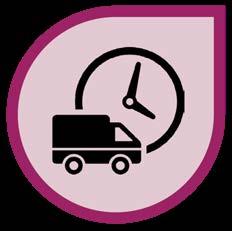
MARKET ACCESS
1.Outcomes
Western Cape Department of Agriculture | Record of Delivery 2019-2024 33
Number Indicator Achievement T.6.1.1 Number of agri-businesses supported with marketing services 173 T.6.1.2 Number of clients supported with production economic services 231 P.6.1.1 Number of enterprises enabled to access business opportunities 96 P.6.1.2 Number of market information outputs disseminated 125 P.6.1.3 Number of activities supported to promote Western Cape agriculture and agri-business 31 T.4.2.1 Number of veterinary certificates issued for export facilitation. 36 657 P.4.2.1 Number of export establishment audits conducted 347 T.4.4.1 Number of laboratory tests performed according to approved standards. 432 374 P.4.4.1 Total number of Veterinary Public Health samples tested. 1444 T.6.2.1 Number of agri-business supported with agro-processing initiatives. 8 P.6.2.1 Number of participants assisted with capacity building in agro-processing initiatives. 282 T.4.3.1 Number of inspections conducted on facilities producing meat. 2 172
2. Achievements
1. The first goal for market access was to increase exports by at least 5% over the next five years from R63 billion in 2018 to R71.6 billion in 2024. Since 2018, agriculture and agri-processing exports increased from R63 billion to R104 billion in 2023.
• Digitisation and modernisation of Veterinary Export Certification Administration Support System;
• Implemented Export Certification Office System (ECOS) - a system warmly embraced by producers dealing with livestock producers. Veterinary Services managed to facilitate exports of goods to the value in excess of R1 billion;
• Investment of R22 million was made towards renovations and modernising the Provincial Veterinary Laboratory (PVL) facilities. Facilities is on par with prescribed world standards, thus enabling recognition of lab results and acceptance of goods as meeting required standards;
• Extensive surveillance conducted throughout the Province to ascertain the state of diseases situation. Unprecedented concurrently occurring outbreaks were reported (Avian Influenza and African Swine Fever) in various locations throughout the Province. These disease occurrences were successfully contained, thus preventing disruptions in trade;
• Secured permanent location for Veterinary Export Certification Office (VECO) in Cape Town. This service centre improves service to clients.
• The Africa Strategy for the agricultural sector in the Western Cape was established to unlock agricultural opportunities in Africa and for the Western Cape;
• Successfully implemented the trade leg of the Western Cape Africa Agriculture Strategy through participation in markets like Ghana, Nigeria, Uganda, Kenya and Angola in preparation of the AfCFTA
• Since the launch of the South African Table Grape campaign in China in collaboration with SATI, SA grape exports to China from 2020 to 2022 totalled 30 905 tons
• Despite the wine market that has been struggling in China for the past few years, South Africa has managed to grow and capture the market share. Wine imports grew in both volumes and value i.e. 29.86% and 29.21% respectively. South Africa has taken the second position on volumes and the first position on value out of 10 countries that China is importing from. Only two countries i.e. South Africa and New Zealand have shown this positive growth;
Western Cape Department of Agriculture | Record of Delivery 2019-2024 34
Number Indicator Achievement P.4.3.1 Average percentage of compliance of all operating abattoirs in the Province to the meat safety legislation 79,71%
Table 7: Outputs for Ministerial Priority on Market Access
• Supported two globally recognised South Africa standards - SIZA and WIETA - to access new markets while maintaining market share, especially in Europe.
-> SIZA collaboration has cultivated robust relationships with retailers and buyers overseas, crucial for ensuring widespread recognition and access to over 340 global markets which have expanded by 51% since 2018.
-> WIETA is recognised by the Sustainable Wine Round Table as one of the top wine social standards globally. Currently 76% of all wine grape tonnage in South Africa is WIETA ethically certified.
• The second goal was to enhance the agri-processing value-add in the province from R48 billion in 2018 to R50.4 billion in 2024. Since 2018, the GVA increased at an annual average growth rate of 2% and amounted to R49 billion in 2022.
-> Launched the Agri-Processing On Wheels (APOW) initiative in 2022 to increase the capacity of agri-processing in rural Western Cape.
-> Subsequently, the Agri-Hub incubation facility together with AgriProcessing On Wheels have received the Food Safety System Certification (FSSC 22000) accreditation which is an internationally recognised scheme for food safety.
-> Since 2020 have facilitated more than R100 million to increase the capacity of agri-processing.
3. Conclusion
At the beginning of the term of office, the Minister of Agriculture set himself goals to increase agricultural exports, from R63 billion to R71 billion. Despite this period being characterised by numerous turbulences such as the COVID-19 pandemic, geopolitical conflicts, ailing infrastructure (e.g. energy and ports) among others, exports almost doubled as they increased to R104 billion in 2023. Therefore, against all odds, this denotes that the Western Cape agricultural sector continues to be a shining star. This among others, is owed to adaptability, cohesion and partnerships that exist especially between various industries in the sector and government, especially the WcDoA.
The Africa Continental Free Trade Agreement (AfCFTA) presents a lot of opportunities for the Western Cape agricultural exports. Through participation in events like Agro Food Ghana, Kenya Food events and others, it’s been observed that the West and East Africa markets have long been waiting for South Africa’s activations in these markets. The province is seeing growth into the African markets, especially on products like wine which is a good indicator for return on investment.
The positive perception in these markets about South African products is indicative that the Western Cape is well positioned to take advantage of opportunities created by AfCFA and hence the Western Cape Africa Agriculture
Western Cape Department of Agriculture | Record of Delivery 2019-2024 35
Strategy was developed. Increased capacity of agri-processing is to enable businesses to gain access to new markets while also ensuring diversity in our export basket. Through APOW activities, enterprises have diversified and new enterprises have been established, improving gross farm incomes while also creating jobs.





Western Cape Department of Agriculture | Record of Delivery 2019-2024 36

CLIMATE CHANGE
Develop and implement the Management Improvement Plan (MIP) from the 2020 SmartAgri evaluation
Commission Master’s degree study on communication aspects of SmartAgri plan and communication on climate change in general in the sector
Appoint climate change and risk scientist to manage the SmartAgri plan implementation internally (departmental) and externally (sector)
Completed in January 2021
The thesis titled “Building Western Cape farmers’ resilience and adaptation to climate change. Assessing the impact of information: The usefulness of Credibility, Salience and Legitimacy in linking information to action” was approved and the student Ms B Siziba graduated at UCT during March 2023.
Prof Stephanie Midgley was appointed as Climate Change and Risk Assessment Scientists on January 2021. In 2023, she was appointed in the new post of Specialist Scientist Climate Change.
Western Cape Department of Agriculture | Record of Delivery 2019-2024 37
1.Outcomes Number Indicator Achievement
P.5.1.1 Number of SmartAgri newsletters published 14 T.2.1.1 Number of agricultural infrastructure established 5 T.2.2.1 Number of hectares of agricultural land rehabilitated 142 708 T.2.2.2 T.2.2.2 Number of hectares of cultivated land under Conservation Agriculture Practices 2 990 T.2.2.3 Number of green jobs created 5 794 P.2.2.1 Number of technical services rendered 5 195 T.2.4.1 Number of awareness campaigns on disaster risk reduction conducted 16
Table 8: Outputs for Ministerial Priority on Climate Change
2. Achievements
• Contributed to the sustainability and development of agriculture by rehabilitating 142 708 hectares of agricultural land with 2 990 hectares of cultivated land under Conservation Agriculture Practices.
• Created 5 794 green jobs in rural areas.
• Rendered 5 195 technical services (LandCare) to mitigate the impacts of climate change and enhance resilience.
• Developed 230 farm management plans to ensure compliance to CARA legislation in terms of sustainable land use and management principles.
• The SmartAgri plan evaluation was concluded in 2020/2021 with seven key recommendations. One of the recommendations from the evaluation was the updating of the climatic data, models and projections in the plan, which was concluded in 2022 and disseminated to stakeholders.
• “Die Kwik Styg” radio series was concluded in 2020/2021 after 104 programmes and received the Gold Award in the Ecologic 2020 Awards in the category Climate Change. A series of climate change booklets emanating from the radio series were transcribed and translated into Afrikaans, English and Xhosa.
• A very successful first ever Youth and Young Researchers in Agriculture Climate Change Summit was presented to 110 delegates during July 2022, followed by the second summit in Oudtshoorn during August 2023.
• The MoU between the Departments of Agriculture and Environmental Affairs and Development Planning and the University of Stellenbosch School for Climate Studies was signed during November 2023.
• The formal signing of the Statement of Commitment of the Mediterranean Climate Action Partnerships was concluded at COP28 in Dubai. Partnership members from Mediterranean regions (14 in total, including the Western Cape) committed to accelerating delivery of climate solutions through information exchanges and knowledge sharing, elevating awareness through a common voice, aligning and implementing policies and solutions to build resilience and tackle the climate crisis, producing an outcomesbased roadmap and create an ongoing programme of meetings and exchange, taking advantage of the most relevant international interactions, and driving and reporting on measurable outcomes.
• Establishment of an interministerial committee on Climate Change. Climate Change is a standing item in the cabinet agenda and is part of the governance framework for climate change adaptation and mitigation.
• SA is the 50 th driest country in the world and climate change is impacting on all aspects of life! Agriculture is also affected by climate change. Last year in 2023 we have experienced four floods. Other parts of the Western Cape experienced droughts for more than seven years.
• Farmers and agri-workers have faced the brunt of climate change.
Western Cape Department of Agriculture | Record of Delivery 2019-2024 38
• Minister Meyer incited a focus to elevate climate change on the Cabinet Agenda and the establishment of an interministerial committee on climate change. This was followed by a very successful Climate Change Summit and the signing of a climate change declaration. This is our pledge to drive efforts towards adaptation. More needs to be done and we will do more with out stakeholder partners, businesses and civil society.
• Climate change requires a collaborative effort and together with the Whole of Government Approach (WOGA) and Whole of Society Approach (WOSA) we are committed to play a leading role in the fight against climate change.
This Ministerial priority has focused attention on the importance of an increase in agricultural production with climate smart production practices and promoting healthy ecosystem functioning through strategically focused ecological infrastructure investment. The Department has confirmed its role and impact as a preferred partner in seeking solutions to climate change challenges in the agricultural sector - at all levels.

3. Conclusion Climate Change pledge


Western Cape Department of Agriculture | Record of Delivery 2019-2024 39
A journey in agriculture...

Five fruitful years for the agricultural sector.
Western Cape Department of Agriculture | Record of Delivery 2019-2024 40
MILESTONES
A TIMELINE OF MINISTERIAL

Western Cape Department of Agriculture | Record of Delivery 2019-2024 41

Western Cape Department of Agriculture | Record of Delivery 2019-2024 42
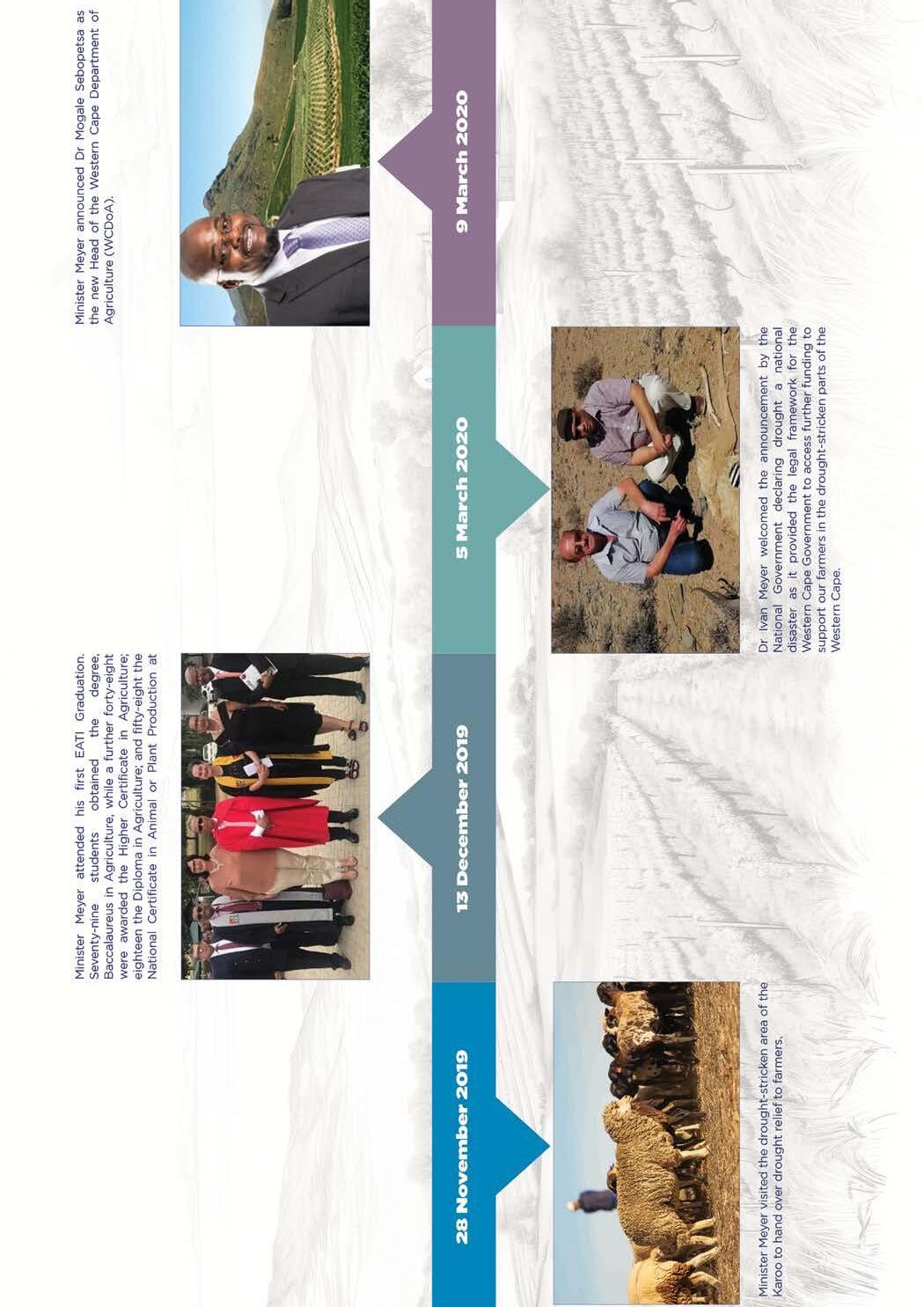
Western Cape Department of Agriculture | Record of Delivery 2019-2024 43

Western Cape Department of Agriculture | Record of Delivery 2019-2024 44

Western Cape Department of Agriculture | Record of Delivery 2019-2024 45

Western Cape Department of Agriculture | Record of Delivery 2019-2024 46

Western Cape Department of Agriculture | Record of Delivery 2019-2024 47

Western Cape Department of Agriculture | Record of Delivery 2019-2024 48

Western Cape Department of Agriculture | Record of Delivery 2019-2024 49

Western Cape Department of Agriculture | Record of Delivery 2019-2024 50

Western Cape Department of Agriculture | Record of Delivery 2019-2024 51

Western Cape Department of Agriculture | Record of Delivery 2019-2024 52

Western Cape Department of Agriculture | Record of Delivery 2019-2024 53

Western Cape Department of Agriculture | Record of Delivery 2019-2024 54

Western Cape Department of Agriculture | Record of Delivery 2019-2024 55

Western Cape Department of Agriculture | Record of Delivery 2019-2024 56

Western Cape Department of Agriculture | Record of Delivery 2019-2024 57

Western Cape Department of Agriculture | Record of Delivery 2019-2024 58

Western Cape Department of Agriculture | Record of Delivery 2019-2024 59

Western Cape Department of Agriculture | Record of Delivery 2019-2024 60

Western Cape Department of Agriculture | Record of Delivery 2019-2024 61
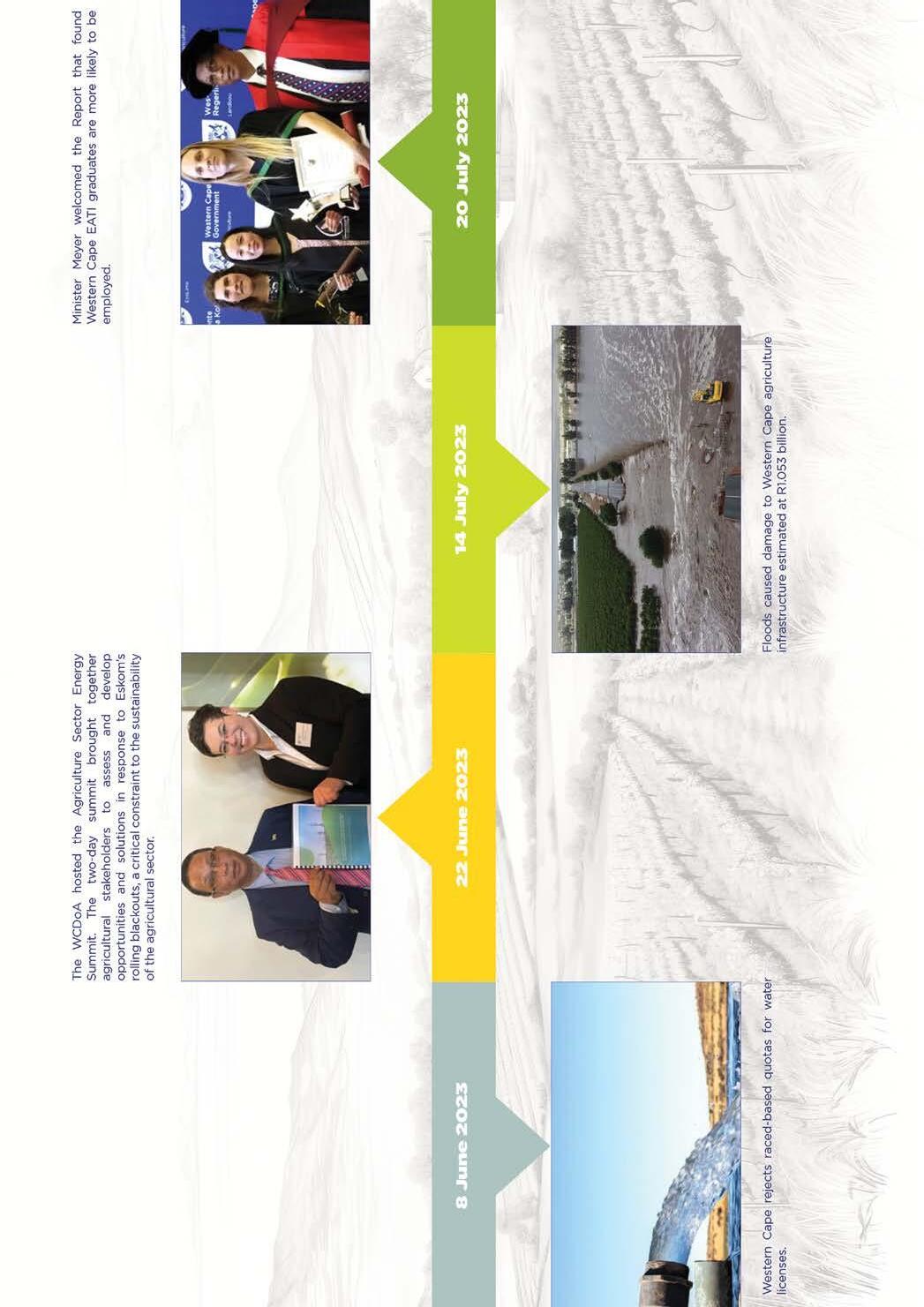
Western Cape Department of Agriculture | Record of Delivery 2019-2024 62

Western Cape Department of Agriculture | Record of Delivery 2019-2024 63

Western Cape Department of Agriculture | Record of Delivery 2019-2024 64
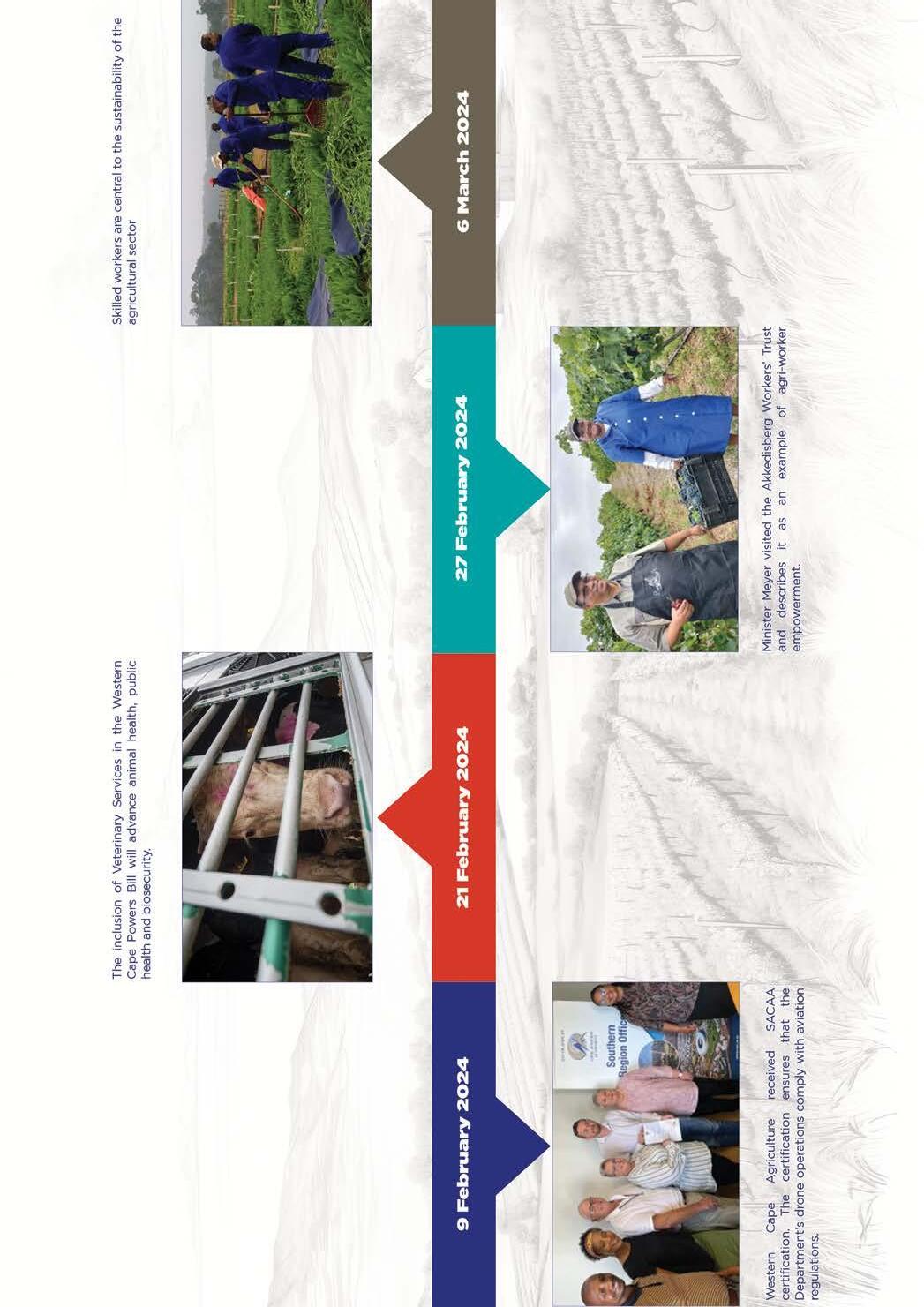
Western Cape Department of Agriculture | Record of Delivery 2019-2024 65

 * This prayer was written by Minister Meyer during the COVID-19 pandemic. As we go through different challenges as a sector, this Prayer remains relevant in providing us with hope.
* This prayer was written by Minister Meyer during the COVID-19 pandemic. As we go through different challenges as a sector, this Prayer remains relevant in providing us with hope.





















































































